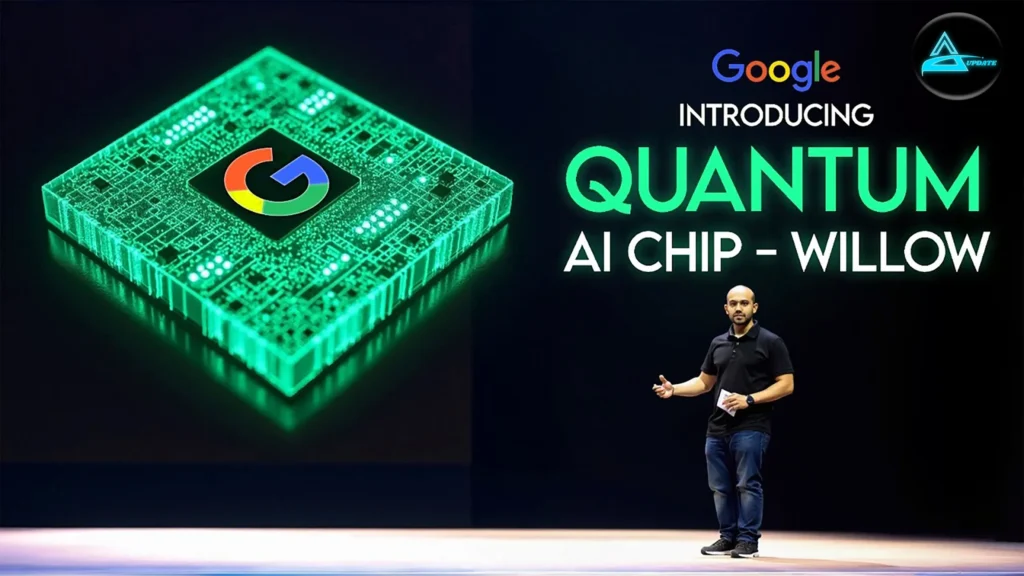Google has again made headlines in the tech world, unveiling its latest breakthrough—an AI-powered quantum chip. This revolutionary innovation is set to redefine the landscape of artificial intelligence and quantum computing, promising unprecedented computational power and efficiency. In this blog post, we delve into the intricacies of Google’s new AI quantum chip, exploring its features, potential applications, and the impact it could have on various industries.
The Basics: What is a Quantum Chip?
Before diving into Google’s creation, it’s essential to understand what a quantum chip is. Unlike traditional chips that rely on bits (representing 0s and 1s), quantum chips use quantum bits or qubits. Qubits can exist in multiple states simultaneously, thanks to the principles of superposition and entanglement. This unique property allows quantum chips to perform complex computations faster than classical processors.
Google’s Quantum Milestone
Google’s journey into quantum computing is not new. In 2019, the company achieved quantum supremacy with its Sycamore processor, solving a computation in 200 seconds that would have taken the world’s fastest supercomputer 10,000 years. The new AI quantum chip builds upon this legacy, integrating advanced AI algorithms to enhance its capabilities.

Key Features of Google’s AI Quantum Chip:
Enhanced Qubit Stability:
Improved error correction mechanisms ensure longer coherence times, making computations more reliable.
AI-Powered Optimization:
AI algorithms integrated directly into the chip enhance its ability to solve optimization problems.
Scalability:
The chip supports more qubits, paving the way for more complex quantum applications.
Energy Efficiency:
Leveraging quantum mechanics reduces energy consumption compared to classical supercomputers.
Real-World Applications
The introduction of Google’s AI quantum chip is poised to disrupt multiple sectors. Here are some areas where its impact could be most profound:
Healthcare:
Drug Discovery:
Accelerating the identification of potential drug molecules by simulating complex chemical interactions.
Genomics:
Analyzing genetic data at unprecedented speeds to advance personalized medicine.
Finance:
Risk Management:
Enhancing predictive models to understand market trends and risks better.
Cryptography:
Strengthening security measures or potentially breaking existing cryptographic protocols.
Climate Science:
Weather Prediction:
Improving the accuracy of climate models and weather forecasts.
Sustainability:
Optimizing energy grids and resource allocation.
Artificial Intelligence:
Neural Network Training:
Speeding up the training of deep learning models.
Natural Language Processing:
Refining AI’s ability to understand and generate human-like text.
Manufacturing:
Supply Chain Optimisation:
Streamlining logistics and inventory management.
Material Design:
Developing advanced materials with unique properties.
Challenges and Limitations
While Google’s AI quantum chip is a groundbreaking achievement, it’s not without challenges. Quantum computing is still in its infancy, and there are hurdles to overcome:
Error Rates:
Despite improvements, qubits remain prone to errors.
Cost:
The development and maintenance of quantum systems are expensive.
Scalability:
Building chips with thousands or millions of qubits remains a significant challenge.
Practical Integration:
Transitioning from research labs to real-world applications requires time and collaboration.
The Competition
Google is not alone in the race for quantum supremacy. Other tech giants like IBM, Microsoft, and startups such as Rigetti and IonQ are also making strides in this domain. Each player brings unique approaches, whether it’s IBM’s Quantum System One or Microsoft’s focus on topological qubits. However, Google’s integration of AI directly into quantum hardware sets it apart, offering a competitive edge.

The Future of AI and Quantum Computing
The convergence of AI and quantum computing heralds a new era of innovation. Google’s AI quantum chip is a significant step towards realizing this vision, but what lies ahead?
Quantum Cloud Services:
Democratizing access to quantum computing via cloud platforms.
AI-Augmented Research:
Accelerating scientific discoveries by leveraging quantum-enhanced AI.
Global Collaboration:
Encouraging partnerships between academia, industry, and governments to tackle global challenges.
Conclusion:-
Google’s new AI quantum chip represents a monumental technological leap, blending the transformative powers of AI and quantum computing. While challenges remain, the potential applications are boundless, promising to reshape industries and solve problems once deemed unsolvable. As we stand on the brink of this quantum revolution, one thing is clear—the future of computing is here, and it’s incredibly exciting.

